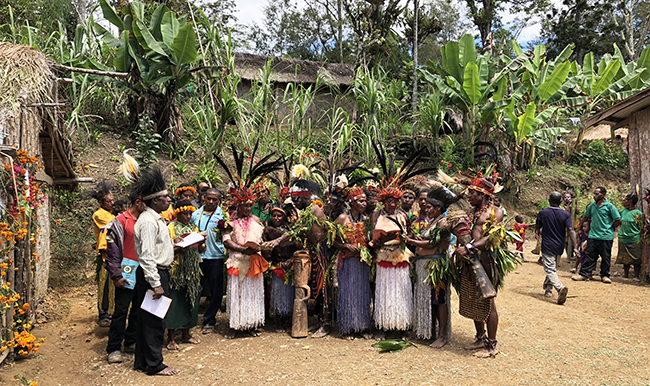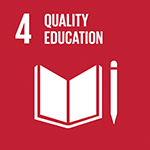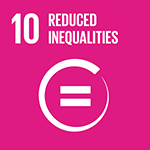ABM Archive Website
THIS WEBSITE CONTAINS ARCHIVE MATERIALS FOR HISTORICAL REFERENCE ONLY
For up-to-date information, including our latest appeals, news, and resources, please visit our current website.
Is Anglicare PNG’s Adult Literacy Program really changing people’s lives?
 |
| Adult learners in Kwiop Village, Jimi Valley. © Kate Winney/ABM, 2018. |
This was one of the key questions that ABM and Anglicare PNG asked during an external evaluation of the program in 2016. What did the evaluation find? And looking back in 2019, how did ABM and Anglicare follow up on the findings?
The evaluation found that in 2016 Anglicare PNG was, with support from the DFAT-funded Church Partnership Program, operating 66 adult literacy schools, attended by over 2,000 learners. The 2,000 learners included people who were ‘oftentimes those with the least power in the community (illiterate, women, widows, youths, elderly)’.
During one-to-one interviews and group discussions, learners spoke of the following benefits:
- Learners and graduates could read the Bible, shop signs, advertisements, and market prices. Learners with access to mobile phones used them more easily, sent text messages and read text messages sent to them (all very valuable in reducing people’s isolation from distant family – particularly to maintain contact with loved ones who had left the local area).
- English language adult literacy learners (in higher level literacy classes) could read medical instructions, fill in bank forms and write formal letters (e.g. job application letters).
- Learners who were parents could better understand what their own children were learning in formal schools and were able to help younger children with homework. They were also able to set a positive example for their children, who saw their parents reading and writing, and putting in efforts in a classroom environment.
There were other program activities that brought additional benefits:
- Learners gained numeracy skills, using these skills to give and receive correct change in the local marketplace and shops. Some women reported that their husbands now couldn’t trick them by giving them the wrong amount of money!
- Teacher training was highly valued by the literacy teachers, who reported that it prepared them well for teaching. The program had built up a cadre of dedicated semi-volunteer personnel (teachers and local literacy coordinators) working in often very remote locations.
- Life skills classes were run in some of the schools (in FY 2014/15, 3% of literacy learners also attended life skills classes. Where these classes incorporated primary health lessons, learners believed that their own and their families’ primary health practices had improved. In one location visited (Siane), the male learners were asked to name the three most valuable changes resulting from literacy classes, and the first change they listed was that learners washed every day, three times each day. Other impacts from the life skills classes related to attitudes to gender-based violence. In one location (the Jimi), teachers and male learners reported that gender-based violence had begun to be now frowned upon by literacy learners.
 |
 |
The evaluation did not say the program was perfect. It made a number of recommendations. Most of these recommendations are being addressed in the current phase of the program:
1. The program should increase and thoroughly integrate life skills courses into literacy classes.
In 2019, Anglicare PNG has not yet thoroughly integrated life skills courses but has increased the number of life skills classes. Currently 17% of adult literacy learners also attend life skills classes – up from just 3% in 2016.
2. Teachers and local literacy coordinators should be provided with increased access to regular capacity building to continually improve practice, competence, and confidence.
In response to this recommendation, Anglicare increased access to teacher trainings. The number of teachers attending training increased from just 6 in FY 2016/17 to 23 in FY 2017/18. Already in the first six months of FY 2018/19, 41 teachers have attended teacher training.
3. Anglicare PNG’s management should be more actively responsive, ensuring funding and materials are disbursed and delivered on time as per plans. There should be regular problem-solving communications maintained between Adult Literacy school clusters and Anglicare headquarters.
Anglicare PNG responded to this recommendation by more frequently visiting and telephoning dioceses. In 2018, Anglicare personnel from the coordination office visited each of the 5 dioceses at least once. To improve the flow of disbursements, Anglicare more frequently used meetings with diocesan staff to discuss Anglicare’s requirements for funds disbursement, including procurement and reporting requirements.
4. Formal agreements should be established with Adult Literacy school communities so that expectations of local and external support and timelines are clear.
Following this recommendation, Anglicare organised MoUs with some communities, e.g. Awala and Sorovi Adult Literacy Schools in Popondetta in 2017. MoUs were also signed with some dioceses, as with Port Moresby Diocese in 2017. Whilst some communities have not yet signed MoUs, some still provide in-kind support. For example, community members voluntarily help prepare the venue for graduation ceremonies.
5. Adult Literacy schools should be used as a foundation for building good governance practice, community development programming, and advocacy.
Anglicare PNG responded to this recommendation in one or two cases. For example, in Aradep (Aipo Rongo) a health promotion committee was established through cooperation between Anglicare programs, community leaders and the local health department. The committee used an adult literacy graduation ceremony to also conduct health awareness-raising.
The evaluation of Anglicare PNG’s Adult Literacy Program in 2016 helped ABM and Anglicare understand how lives were being changed across PNG. The evaluation also helped us understand what parts of the program might be improved. The evaluation led to an increase in numbers of literacy learners studying life skills, an increase in teacher trainings, and a number of smaller changes. This follow-up shows that we are, in fact, all learners.
< Back


